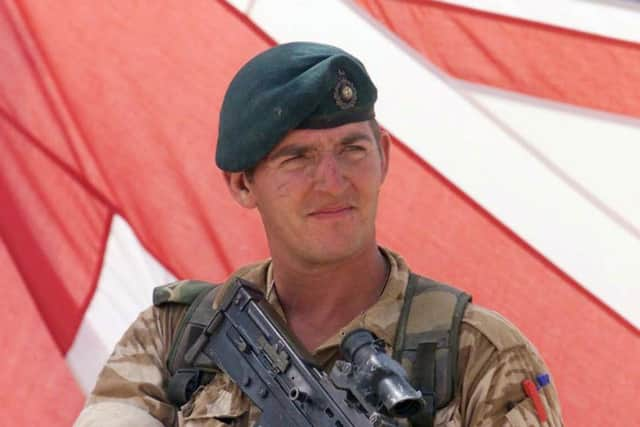Marine who murdered Taleban fighter ‘let standards slip’


The Royal Navy internal review looked at events surrounding the shooting of the wounded captive by Sergeant Alexander Blackman in Helmand province in September 2011.
Blackman, who was serving with Plymouth-based 42 Commando, quoted Shakespeare as he shot his victim in the chest at close range with a 9mm pistol after the Afghan had been seriously injured in an attack by an Apache helicopter.
Advertisement
Hide AdAdvertisement
Hide AdHe is serving an eight-year jail sentence after being convicted by a court martial of murder over the killing.


The Navy released a redacted 12 page executive summary of its review into the incident.
“Sgt Blackman allowed professional standards to slip to an unacceptable low level at CP Omar,” the report found.
“His poor leadership was a significant contributory factor in the way the insurgent was treated by other members of the patrol.
“Sgt Blackman’s rank was a significant contributory factor in preventing others within the patrol from questioning his orders or challenging his actions.
“Group conformity and the patrols positive past experiences of Sgt Blackman may also have contributed.
“Moral disengagement on the part of Sgt Blackman and the members of his multiple was a significant contributory factor in the handling and shooting of the insurgent.
“The difficulty experienced by Sgt Blackman in changing from a mind-set which required him to kill an enemy to one which accepted having to administer first aid to an enemy in order to try and save his life, was a contributory factor in his treatment of the insurgent.”
Advertisement
Hide AdAdvertisement
Hide AdFootage from another marine’s helmet-mounted camera showed Blackman shooting the Afghan prisoner in the chest with a 9mm pistol.
Blackman was then heard telling him: “There you are. Shuffle off this mortal coil, you c***. It’s nothing you wouldn’t do to us.”
He then turned to comrades and said: “Obviously this doesn’t go anywhere, fellas. I just broke the Geneva Convention.”
During the trial at Bulford Court Martial Centre in Wiltshire two years ago, Blackman was known as Marine A.
He denied murder, saying he believed the victim was already dead and he was taking out his anger on a corpse.
Blackman, of Taunton, Somerset was convicted of murder and jailed for a minimum of 10 years.
His conviction challenge was rejected by the Court Martial Appeal Court, although his minimum term was cut to eight years because of the combat stress disorder he was suffering at the time of the incident.
A campaign has been launched to review Blackman’s case saying the killing was manslaughter and not murder.
Advertisement
Hide AdAdvertisement
Hide AdAuthor and campaigner Frederick Forsyth said the court martial that convicted Blackman “stank from top to bottom”.
Blackman’s case is due to be discussed in the House of Commons later at the request of Conservative MP Richard Drax.
Vice Admiral Sir Philip Jones, fleet commander of the Royal Navy, said: “The Naval Service has today released an extract from our internal review into a range of issues ancillary to the incident which led to the shooting of a wounded insurgent and which resulted in the conviction for murder of Sergeant Alexander Blackman.
“I directed the review to investigate the wider issues arising from this incident, such that they may provide lessons for the future training, preparation and conduct of the Royal Marines and the wider Naval Service on operations.
“It addressed the ethos, cultural literacy and rules of engagement for Royal Marine personnel and made 17 recommendations for change to ensure the continued operational effectiveness of the Naval Service in future operations.
“I have accepted the review and its recommendations in full. Of these, some remedial actions were captured earlier in the review process and their progress to date is reflected in the accompanying extract. The remaining recommendations are now being implemented.”
Sir Philip said it was “not appropriate” to release the internal review in full because it contained “information considered sensitive from an operational, security and personal perspective”.
“For these reasons, it is not appropriate to release the internal review in full,” he said.
Advertisement
Hide AdAdvertisement
Hide Ad“However, in recognition of the heightened sensitivity and public interest in this matter, a suitably redacted version of the review’s executive summary and recommendations has been made available to the public.
“As part of this release I am also including my review instruction.
“What happened on September 15 2011 was not consistent with the ethos, values and standards of the Royal Marines.
“As a key part of its support to, and command of, the Royal Marines, the Naval Service is determined to ensure that the sequence of events that led to the shooting is fully understood and that all possible lessons are learned.
“The Royal Marines deservedly have a worldwide reputation as one of the elite fighting forces.
“Our Commandos go through one of the toughest training programmes in order to deploy to some of the harshest environments in the world. I am proud of its reputation and achievements.”